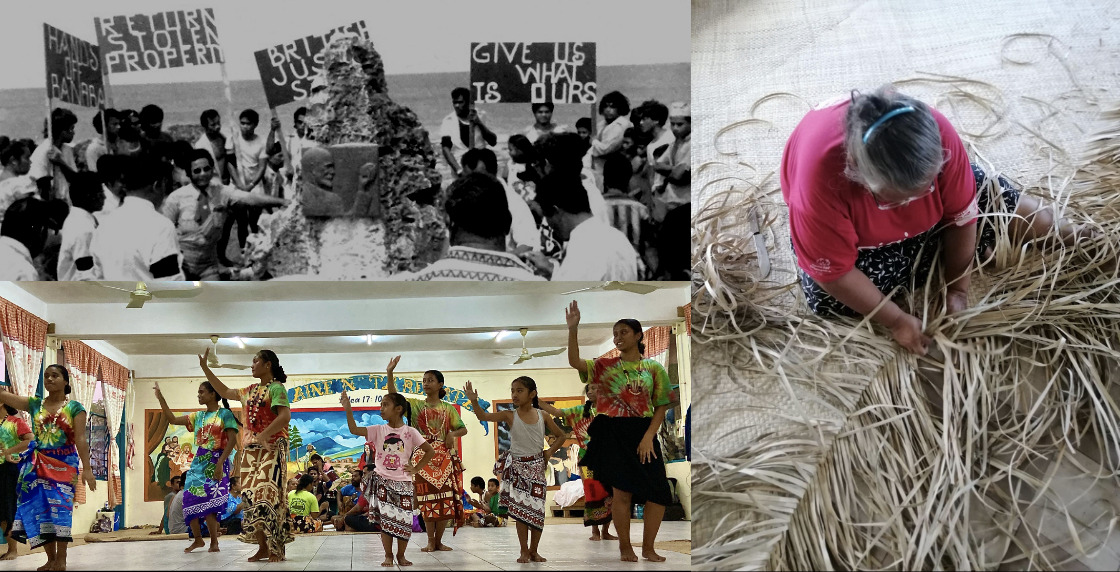
An art exhibit is bringing the struggles of the Banaban community to the global stage, providing them with a platform to share their history and demands for action from the governments of Fiji and Kiribati to safeguard their human rights.
Through 9 March, Tāmaki Makaurau Auckland’s Silo 6 exhibition space is featuring handicrafts, photos and videos from Banaban artists and storytellers that highlight their culture and history.
The exhibit shines a light on the forced displacement of Banabans from Banaba to Rabi Island due to phosphate mining in the mid 20th century – a history that remains too often forgotten.
The Story of Banaba
As a colonial power, New Zealand exploited Pacific Islands such as Banaba Island, part of modern-day Kiribati, where 90% of the island’s surface was mined by the British Phosphate Commission – jointly owned by the British, Australian and New Zealand governments – from the early 1900s to the end of the 1970s. This extractive practice left behind barren and uninhabitable land, resulting in the forced resettlement of Banabans to Rabi island in Fiji in 1945.
To this day, Banabans on Rabi Island face discrimination as a partially self-governing entity falling between the cracks of Fiji and Kiribati. For the few hundred Banabans that have remained on their home island, lack of access to clean water and food imports create persistent challenges.
Local Change Maker on Rabi, Rae Bainteiti, shared: “As the Banabans commemorate 77 years this year on Rabi, the sad reality is that nothing major has happened in terms of development to uplift this community to thrive in their new home and in their homeland, Banaba.
“This exhibit not only highlights what went wrong with the Banaban story of displacement, but more importantly how policymakers, legislators, politicians and advocates can use the story of my people to craft future policies and laws that actually work for climate-induced displaced communities of the future. For us Banabans, we have a long way to go, and this project is an important step in the right direction.”
Solidarity Through the Arts
The art exhibition allows for audiences to explore Banaban history, the impacts of mining on communities, and stories of resistance. Their story also offers urgent lessons for the impending displacement in the region caused by climate change.
The initiative has been designed and created by the International Center for Advocates Against Discrimination (ICAAD), the Banaban Womens Organization (BWO), and the Banaban community in Auckland and Rabi. It is supported by Creative New Zealand, Amnesty International, The New Zealand Commission for UNESCO, and the Taiwan Foundation for Democracy.
ICAAD’s Director and Change Facilitator, Erin Thomas, said: “We are thrilled to be supporting the Banaban community with this exhibit. The arts are a powerful tool for building solidarity and raising awareness. It is our hope that this collaboration leads to more global awareness about the issues facing the Banaban community on Rabi and across the diaspora, which in turn translates to more support as they advocate for their rights.”
Advocating for Change
For Banabans, there has been a lack of clarity around citizenship rights which, coupled with an political marginalisation, has led to discrimination and exclusion. This is compounded by the lack of access to resources and development support, both on Rabi and on Banaba. The exhibit showcases the long-standing nature of these issues through archival photographs, interviews and videos spanning decades.
In order to better safeguard the human rights of Banabans, ICAAD and the Banaban community have set out a series of recommendations for the governments of Kiribati and Fiji.
- The Kiribati government must take immediate action to ensure access to basic food supplies and clean water on Banaba.
- The Fiji Office of the Prime Minister should embark on an urgent fact-finding mission to Rabi to evaluate development outcomes. This trip should also include a scoping assessment to plan an election to reinstate the Rabi Council of Leaders. This should include amendments to the Banaban Settlement Act 1970.
- Both the Kiribati and Fiji governments should extend guarantees of dual citizenship for Banabans. This has not always been the case, and this guarantee is crucial for the enjoyment of a number of human rights.
- Both the Kiribati and Fiji governments should extend support to Banabans applying for citizenship, which should include reducing the application fee and simplifying processes.
- The Fiji government should establish a Ministry for Minor Ethnic Groups with a specific budget for development assistance on Rabi, Kioa, and Rotuma.
These recommendations would begin to close the gap in human rights protections that Banabans currently face. The community is asking for the public’s help in amplifying their message by sharing their story online using the hashtag #JusticeforRabi. By providing greater visibility, the exhibit aims to provide a platform for change.
This initiative is part of ICAAD’s Right to Life with Dignity Project, where we are working to support the mobility of climate-displaced persons around the world, as well as our Artivism program, which promotes human rights through the arts.
